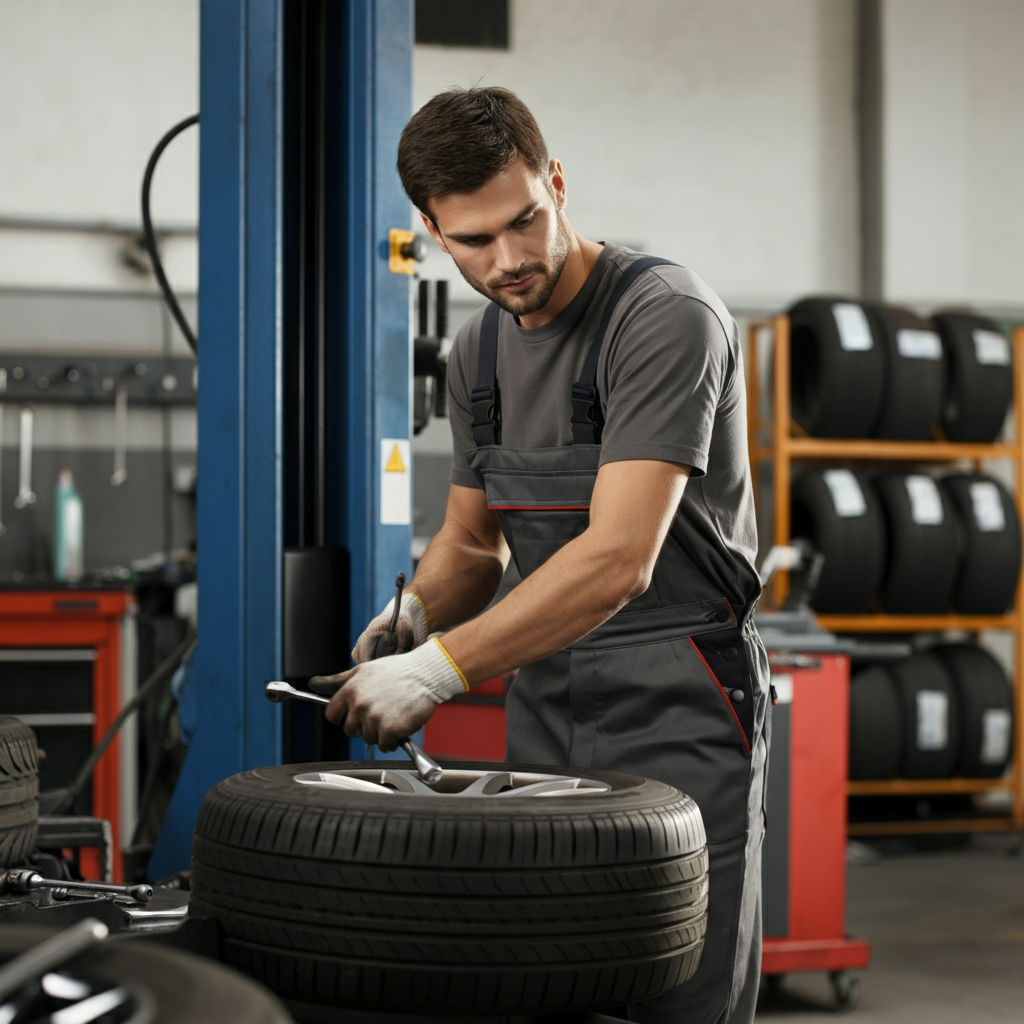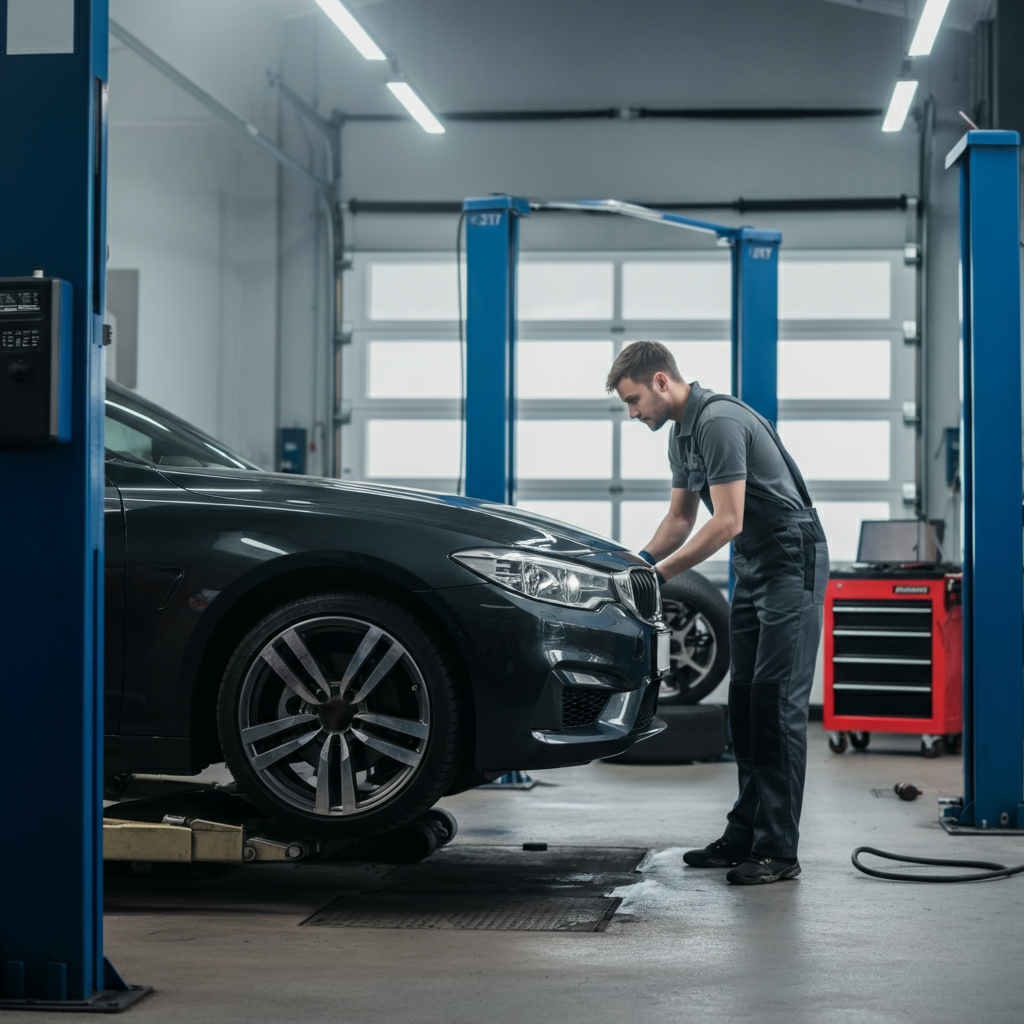Your tyres are one of the most critical safety components on your vehicle, but they are also the most likely to suffer from wear and tear. Knowing how to spot the early signs of tyre trouble is essential not just for your safety, but also for ensuring your car is legal, roadworthy, and can pass its MOT. Ignoring potential tyre problems can lead to dangerous situations on the road and invalidate your insurance.
For drivers navigating the streets of Hull, understanding common tyre problems, how to get them repaired, and when a replacement is necessary is key to safe and worry-free motoring. This guide covers everything you need to know about looking after the tyres on your car.
Common Tyre Problems Seen in Hull
The unique conditions of local roads can take their toll on your rubber. From potholes to wet weather, here are some of the most frequent tyre problems Hull drivers face.
- Punctures: Debris like nails, screws, and sharp stones on the road are a common cause of punctures. A slow puncture can be hard to detect initially but will cause your tyre to lose pressure over time, affecting handling and fuel economy.
- Sidewall Damage: Hitting a kerb or a deep pothole can cause cuts, scrapes, or bulges on the side of your tyre. Sidewall damage is particularly dangerous as this part of the tyre is not designed to be repaired, and a bulge indicates internal structural failure.
- Uneven Wear: If you notice one edge of your tyre wearing down much faster than the rest, it’s a classic sign of a wheel alignment issue, often caused by hitting potholes. Wear in the centre suggests over-inflation, while wear on both edges points to under-inflation.
- Bulges: A bulge or lump on the tyre surface is a serious sign of tyre damage Hull drivers should never ignore. It means the internal structure of the tyre has been compromised, creating a weak spot that could lead to a sudden and dangerous blowout.
Hull’s combination of urban driving, occasional rough road surfaces, and wet weather makes regular tyre checks a vital part of car ownership.
How to Diagnose Tyre Issues at Home
You don’t need to be a mechanic to spot the most common signs of tyre trouble. Performing these simple checks once a month can help you catch issues early.
Visual Checks
- Tread Depth: The legal minimum tread depth in the UK is 1.6mm. Use a 20p coin to get a rough idea—if you can see the outer band of the coin when it’s placed in the main tread groove, your tread is likely too low and needs a professional check.
- Sidewall Condition: Walk around your car and inspect the sidewalls of each tyre for any visible cuts, cracks, or bulges.
- Objects in the Tyre: Look for anything that might have become embedded in the tread, such as a nail or a piece of glass.
Physical Sensations While Driving
- Vibration: If you feel a vibration through the steering wheel, especially at certain speeds, it could be a sign that your wheels are unbalanced or that a tyre has developed a flat spot or bulge.
- Pulling to One Side: A car that consistently pulls to the left or right when you’re trying to drive straight often indicates a wheel alignment problem, which will cause uneven tyre wear.
- Noise: An unusual humming, whirring, or thumping sound that changes with your speed can point to a range of tyre problems, from uneven wear to a failing wheel bearing.
Repair vs. Replace: A Decision Guide
When you have tyre damage, you face the choice: can it be repaired, or do you need a full tyre replacement? The answer depends on the type, size, and location of the damage.
When Can a Tyre Be Repaired?
A tyre repair is only considered safe and legal under specific conditions, as outlined by the British Standard BS AU 159. For a tyres repair Hull service to be viable:
- The puncture must be within the central three-quarters of the tread.
- The puncture hole must not be larger than 6mm in diameter.
- The tyre must not have any other signs of damage, like sidewall bulges or exposed cords.
- The tyre must not have been driven on for an extended period while flat, as this can cause internal damage.
When Must a Tyre Be Replaced?
A tyre replacement Hull is non-negotiable in the following situations:
- Sidewall Damage: Any puncture, cut, or bulge on the sidewall means the tyre is scrap.
- Illegal Tread Depth: If the tread is worn below the 1.6mm legal limit.
- Age: If the tyre is over 10 years old, the rubber can become brittle and unsafe, even if it has plenty of tread.
- Major Damage: Large cuts or punctures outside the repairable zone render the tyre unsafe.
Costs and Tips for Tyre Replacements
The cost of a new tyre can range from around £50 for a budget brand on a small car to several hundred pounds for a premium, high-performance tyre. When you get a quote, ensure it includes fitting, balancing, a new valve, and disposal of the old tyre. At Hull City Tyres, a typical tyre fitting takes around 30 minutes.
Maintenance and Prevention Tips
The best way to deal with tyre problems is to prevent them from happening in the first place.
- Check Pressures Monthly: Correct inflation is the single most important factor in tyre longevity.
- Check Alignment Annually: An annual wheel alignment check can save you hundreds of pounds in premature tyre replacements.
- Rotate Your Tyres: Swapping front and rear tyres every 6,000 miles helps promote even wear.
- Drive with Care: Avoid hitting kerbs and driving through potholes where possible.
When to Visit Hull City Tyres
While home checks are useful, some issues can only be diagnosed by a professional. You should visit us if:
- You suspect any form of tyre damage.
- Your car is exhibiting unusual vibrations or pulling to one side.
- You need an urgent replacement or a professional puncture repair.
Our experienced team will conduct a thorough assessment, providing honest advice on whether a repair is safe or if a replacement is needed. We use modern, calibrated equipment to ensure every fitting and repair is done to the highest standard.
Get a Free Tyre Safety Check in Hull
Don’t wait for an MOT failure or a roadside emergency to think about your tyres. Your safety is too important to leave to chance. Book your car in for a free, no-obligation tyre safety check at Hull City Tyres today. Our friendly technicians will give you a clear assessment of your tyres’ condition and provide a transparent quote for any work that may be required.



